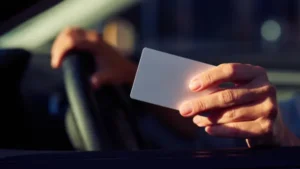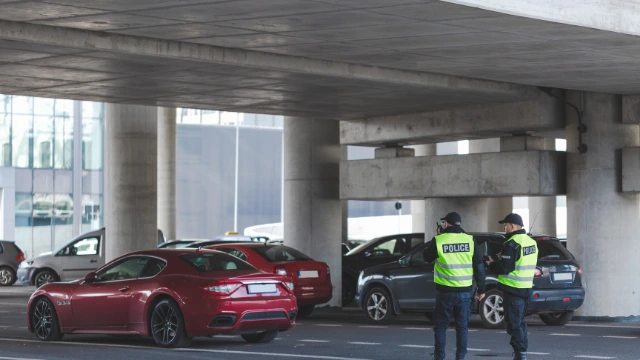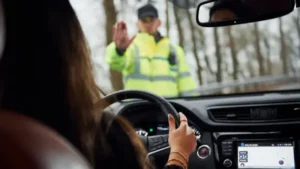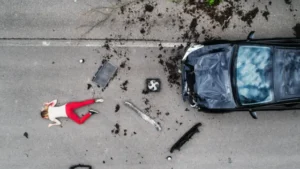

The Serious Consequences of Criminal Traffic Offenses
Imagine rushing home after a long day at work. You push the speed limit, not realizing you’re going well over 30 mph above the legal limit. Moments later, flashing lights appear behind you, and you’re pulled over. What seems like a routine traffic stop suddenly turns into an arrest for reckless driving—a criminal traffic offense.
Traffic violations range from minor infractions to criminal offenses that carry severe legal consequences. When traffic violations escalate to criminal charges, drivers face fines, probation, and incarceration, depending on the severity of the offense and state laws.
Understanding these penalties is crucial if you or a loved one is facing criminal traffic charges. Knowing your legal options can help you fight the charges, reduce penalties, or avoid a conviction altogether.
Fines: The Financial Burden of Criminal Traffic Convictions
One of the most common penalties for criminal traffic offenses is fines. Unlike minor infractions that result in simple traffic tickets, criminal traffic violations come with substantial fines that can range from hundreds to thousands of dollars.
How Fines Are Determined
The amount a driver must pay depends on several factors, including:
- The severity of the Offense: More serious offenses, such as DUI, reckless driving, or hit-and-run, come with higher fines.
- State-Specific Laws: Each state has its fine structure. For example, in California, reckless driving fines start at $500 but can reach $5,000 with added penalties.
- Additional Court Costs: Drivers may also have to pay for court fees, license reinstatement fees, and other administrative costs.
Examples of Criminal Traffic Fines
- DUI (Driving Under the Influence): Fines range from $1,000 to $10,000, depending on prior convictions.
- Reckless Driving: Typically carries fines between $250 and $5,000.
- Hit-and-Run (Property Damage): Fines start at $500 but increase if injuries are involved.
- Driving with a Suspended License: This can result in fines from $200 to $2,000, depending on prior offenses.
Beyond the financial strain, fines also lead to higher insurance premiums, adding long-term financial consequences to a criminal traffic conviction.
Probation: A Legal Alternative to Jail Time
For certain criminal traffic offenses, courts may sentence a driver to probation instead of or in addition to other penalties. Probation allows individuals to avoid jail but requires strict compliance with court-ordered conditions.
Types of Probation for Criminal Traffic Offenses
- Informal (Unsupervised) Probation:
- No regular check-ins with a probation officer.
- Driver must avoid committing new offenses and fulfill court-ordered requirements.
- Formal (Supervised) Probation:
- Requires regular meetings with a probation officer.
- May include random drug testing for DUI-related offenses.
- Noncompliance can lead to revocation of probation and jail time.
Common Probation Terms for Traffic Offenses
- Completion of a Defensive Driving Course: Mandatory for reckless driving or excessive speeding offenses.
- Community Service: Some drivers must complete hours of volunteer work instead of jail time.
- Installation of an Ignition Interlock Device (IID): Required for DUI convictions in many states.
- Mandatory Check-Ins with a Probation Officer: Required for serious offenses such as felony hit-and-run or repeat DUI cases.
Probation is often a preferred alternative to incarceration, but violating probation terms can result in additional penalties, including jail time.
Incarceration: When Jail Time Becomes a Reality
Certain criminal traffic violations carry mandatory incarceration, particularly if the offense involves injury, property damage, or reckless endangerment.
Criminal Traffic Offenses That Lead to Jail Time
- DUI (Driving Under the Influence): Many states impose mandatory jail time for first-time DUI offenders, with repeat offenses leading to months or years in prison.
- Vehicular Manslaughter: Causing a fatal accident due to negligence or reckless behavior can result in years of incarceration.
- Felony Hit-and-Run: Leaving the scene of an accident that involves injuries can lead to state prison sentences ranging from one to five years.
- Street Racing: Illegal speed contests often result in 30 to 90 days in jail, with enhanced sentences for repeat offenders.
Judges consider multiple sentencing factors when determining jail time, including whether the driver has prior convictions, whether they were under the influence of drugs or alcohol, and whether other people were injured.
Case Study: How One Driver Reduced His Criminal Traffic Sentence
Background
Mark, a 28-year-old delivery driver, was charged with reckless driving and hit-and-run after sideswiping a parked car and leaving the scene. Facing up to six months in jail, he hired an experienced traffic attorney to fight the charges.
Defense Strategy
Mark’s lawyer built a case around the following:
- Lack of Criminal Intent: Mark was unaware that his car had made contact with the parked vehicle.
- First-Time Offender Status: He had no prior criminal history, which the judge considered in sentencing.
- Restitution to the Victim: He agreed to pay for all damages to the vehicle, which helped mitigate penalties.
- Plea Bargain for a Lesser Charge: His attorney negotiated a reduction from a criminal hit-and-run to a minor traffic violation.
Outcome
Instead of six months in jail, Mark received probation, community service, and a fine. His record remained clean of a criminal conviction, allowing him to keep his job.
Final Thoughts
Criminal traffic penalties can result in severe consequences, but understanding your legal rights and options can help you reduce or avoid jail time, minimize fines, and protect your record. If you are facing criminal traffic charges, seeking the help of an experienced traffic defense attorney is crucial for achieving the best possible outcome.
Frequently Asked Questions (FAQs)
- What qualifies as a criminal traffic offense? Criminal traffic offenses include DUI, reckless driving, hit-and-run, vehicular manslaughter, and driving with a suspended license.
- Can I avoid jail time for a criminal traffic charge? In many cases, plea bargains, probation, and alternative sentencing options can reduce jail time.
- How can I fight a criminal traffic charge? Hiring a criminal defense attorney can help challenge evidence, negotiate plea deals, and explore alternative sentencing.
- Does a criminal traffic conviction stay on my record forever? Some offenses may be expunged after a certain period, but serious convictions like DUI and hit-and-run can remain permanently.
- Will a criminal traffic conviction affect my insurance? Yes, most criminal traffic violations result in higher insurance rates or policy cancellations.



